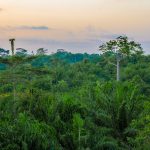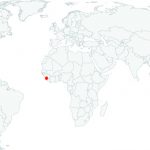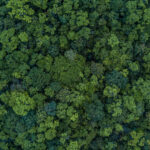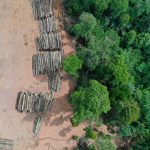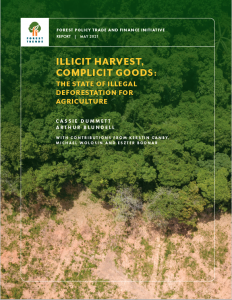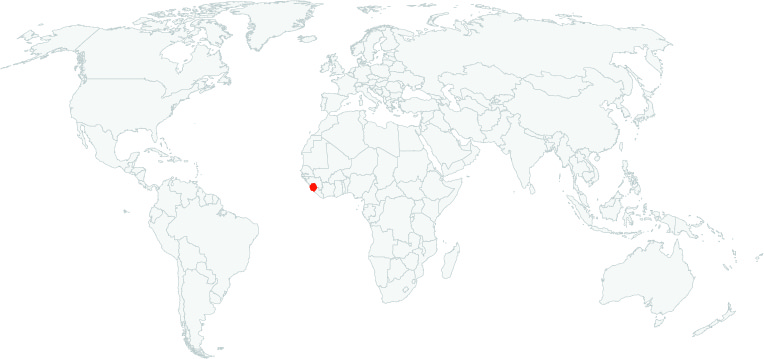
Chinese demand for tropical timber, particularly rosewood, has driven a massive wave of illegal logging across West Africa over the past decade. From 2012 to 2019, Ghana exported roughly 540,000 metric tons of rosewood to China — the equivalent of six million trees and approximately 2,000 acres of forest loss. This occurred despite multiple national export bans and international restrictions under CITES.
Between 2017 and 2022, rosewood exports from West Africa to China were estimated to exceed US $2 billion. Although rosewood is the most prominent species, the demand extends to other high-value hardwoods, contributing to widespread illegal logging and accelerating deforestation across the Sahel and coastal forests.
Illegal logging now accounts for the majority of timber harvested in several West African countries. It is estimated that 70 percent of logging in Ghana, 65 percent in Cameroon, and 56 percent in Nigeria occurs outside the legal framework. These activities are often enabled by weak enforcement, corruption, and the complicity of local traders who act as intermediaries for Chinese buyers.
In Nigeria, annual government revenue losses from illegal logging are estimated between US $191 million and US $383 million. Cameroon loses between US $51 million and US $103 million each year, while Côte d’Ivoire forfeits roughly US $38 million to US $76 million. These figures represent lost taxes, royalties, and fees that could otherwise support local communities and forest protection.
In Mali, for example, despite a 2020 ban on rosewood exports, nearly 150,000 tons—equivalent to roughly 220,000 trees—were still shipped to China in subsequent years. Such cases illustrate the scale of smuggling networks operating with impunity across porous borders. In Cameroon, Chinese-backed agribusinesses have cleared over 10,000 hectares of forest since 2011 for rubber plantations, contributing to an estimated 45,000 hectares of total deforestation linked to Chinese commercial interests. This land conversion often overlaps with community forests or protected areas.
Since 2000, the country has lost over 35 percent of its total tree cover and 14 percent of its humid primary forests —- some of the world’s most ecologically significant habitats -– according to Global Forest Watch, an online monitoring platform. Over the past decade and a half, the government has stepped up its conservation efforts, with the creation of the NPAA in 2012 and the Ministry of Environment and Climate Change in 2018.
A group of Sierra Leoneans, hired by a Liberian businessman, are conducting an illegal logging operation in a forest in Nimba County, according to documents, interviews and photographs.
With the help of locals, the operations are producing thick timber near the Ivory Coast border in Karnplay, Gbelay-Geh District.
The Sierra Leoneans’ operations violate the Chainsaw Milling Regulation, which bars non-Liberians from working in the subsector, evidence shows. Their products go against the standard measurement for planks, matching a form of logging recently banned by the Forestry Development Authority (FDA).
Illegal logging is a growing feature of transnational organized crime in Africa, often facilitated by the collusion of senior officials, with far-reaching security and environmental implications for the countries affected.
Last Saturday, President Dr Julius Maada Bio visited the Guma Valley Dam at Mile 13 in Freetown to see the massive deforestation taking place in the area to make way for community settlements, and called ordered the re-establishment of the Western Area Forest Green Belt and an immediate investigation into the activities of the Ministry of Lands and Housing following accusations of maladministration and corruption.
Sierra Leone’s Minister of Agriculture, Forestry and Food Security, Dr. Abu Bakarr Karim, is personally benefiting from the horrific and most ruinous illegal logging Sierra Leone has ever seen. The ministry is one of the most corrupt in the country, and it is the main driving force behind the current catastrophic food insecurity and the environmental and ecological degradation overtaking Sierra Leone.
Click here to access the Global Illegal Logging and Associated Trade (ILAT) Risk assessment tool and to download the Forest Trends User Guide describing the functionality of the ILAT Risk Data Tool.
Click here to access the Cattle Data Tool.


